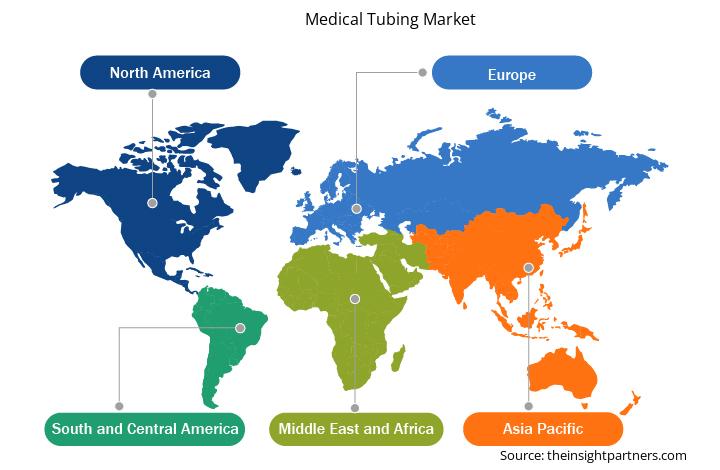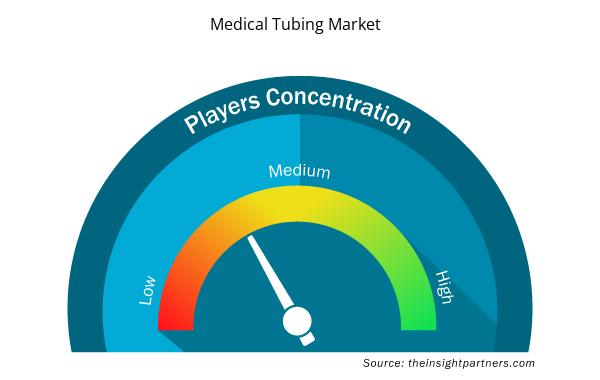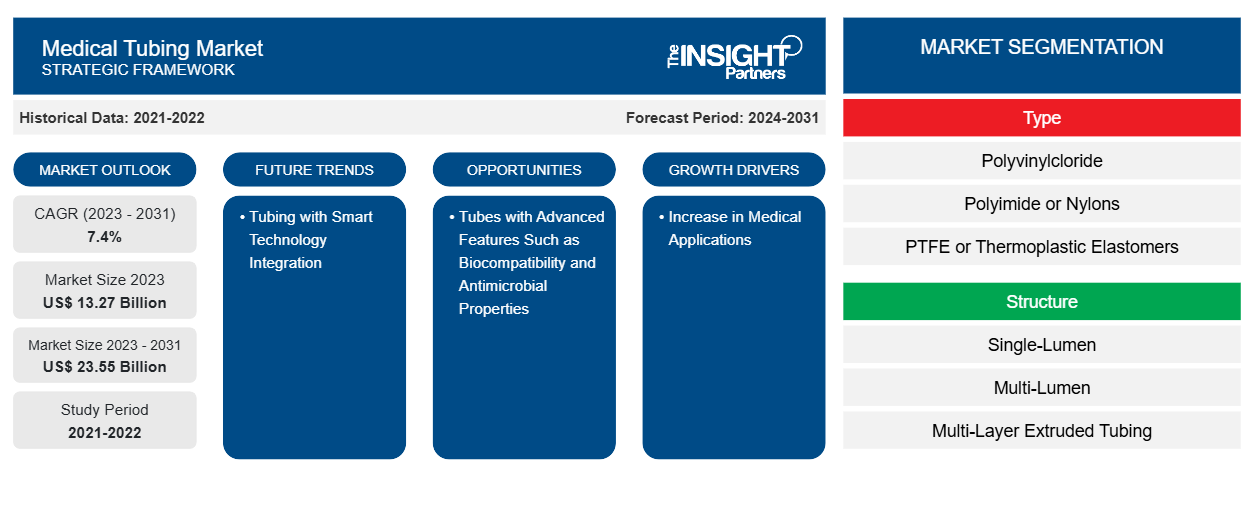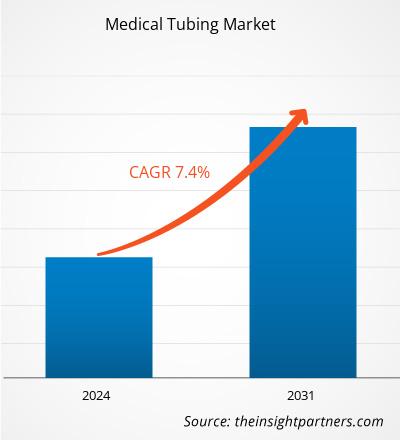Si prevede che la dimensione del mercato dei tubi medicali raggiungerà i 23,55 miliardi di dollari entro il 2031, rispetto ai 13,27 miliardi di dollari del 2023; si stima che il mercato crescerà a un CAGR del 7,4% nel periodo 2023-2031. L'adozione di tubi con integrazione di tecnologia intelligente agirà probabilmente come una tendenza futura nel mercato nei prossimi anni.
Analisi del mercato dei tubi medicali
L'uso di tubi medicali è in aumento nei settori farmaceutico e biofarmaceutico. La bioelaborazione comporta l'utilizzo di cellule viventi o dei loro componenti per produrre i prodotti desiderati. Questo processo richiede soluzioni di tubi specializzate per garantire efficienza, sicurezza e aderenza a rigorosi standard normativi. La sterilità dei materiali utilizzati è fondamentale nelle applicazioni di bioelaborazione. I tubi di grado medicale realizzati con materiali biocompatibili come silicone ed elastomeri termoplastici (TPE) sono essenziali per prevenire la lisciviazione di sostanze nocive nei prodotti biofarmaceutici. La crescente enfasi normativa sulla sicurezza e l'efficacia dei prodotti spinge la domanda di soluzioni di tubi medicali che garantiscano elevati livelli di purezza e biocompatibilità durante la bioelaborazione.
I tubi con caratteristiche avanzate come la biocompatibilità e le proprietà antimicrobiche genererebbero significative opportunità di crescita nel mercato dei tubi medicali in futuro. I produttori possono personalizzare i tubi per dispositivi medici come cateteri , endoscopi e sistemi di infusione collaborando con i professionisti sanitari, migliorando in definitiva la funzionalità e l'efficacia dei prodotti finali. A gennaio 2022, Otsuka Pharmaceutical Factory, Inc. ha introdotto "Actreen", un catetere monouso con tubo e connettore. Può essere utilizzato da pazienti che hanno perso lo stimolo a urinare o che optano per l'autocateterizzazione a causa della difficoltà riscontrata durante la minzione.
Panoramica del mercato dei tubi medicali
Il settore sanitario in Cina sta crescendo rapidamente a causa dell'aumento delle spese sanitarie, dell'invecchiamento della popolazione e della crescente domanda di apparecchiature mediche. Il paese è obbligato a modernizzare le sue strutture mediche e l'assistenza sanitaria, il che alimenta la domanda di dispositivi medici di qualità. I tubi medici sono spesso richiesti in applicazioni quali terapia endovenosa, assistenza respiratoria e procedure chirurgiche. L'innovazione è una forza trainante altamente rilevante nel mercato cinese. I produttori di vari settori sanitari sono fortemente orientati all'innovazione; stanno inventando materiali e tecnologie con prestazioni migliori, caratteristiche di sicurezza, ecc. I prodotti per tubi medici realizzati utilizzando materiali biocompatibili e tecnologie intelligenti stanno guadagnando una notevole trazione nel mercato cinese. I dispositivi per tubi medici integrati con tecnologie intelligenti aiutano nel monitoraggio in tempo reale delle condizioni dei pazienti. Mappando tali potenziali vie di crescita, i principali attori si stanno concentrando sull'espansione delle loro basi di produzione in Cina e in altri mercati simili nell'Asia Pacifica. Ad esempio, come da annuncio fatto nell'agosto 2022, DuPont ha aggiunto una nuova capacità produttiva per i suoi tubi Liveo Pharma in silicone presso i suoi stabilimenti di produzione nella Cina orientale. L'azienda punta inoltre a potenziare la produzione per realizzare tubi biofarmaceutici ad elevata purezza da commercializzare nella Grande Cina.
Personalizza questo report in base alle tue esigenze
Riceverai la personalizzazione gratuita di qualsiasi report, comprese parti di questo report, o analisi a livello nazionale, pacchetto dati Excel, oltre a usufruire di grandi offerte e sconti per start-up e università
- Scopri le principali tendenze di mercato in questo rapporto.Questo campione GRATUITO includerà analisi di dati che spaziano dalle tendenze di mercato alle stime e alle previsioni.
Driver e opportunità del mercato dei tubi medicali
Aumento delle applicazioni mediche del mercato dei carburanti per tubi
I tubi medicali sono utilizzati in varie applicazioni mediche e farmaceutiche, tra cui gestione dei fluidi, drenaggio, anestesiologia, apparecchiature respiratorie, somministrazione endovenosa (EV), cateteri, pompe peristaltiche, dialisi, sondini per l'alimentazione e apparecchiature di laboratorio biofarmaceutiche. Gli interventi medici che coinvolgono tubi medicali specializzati sono spesso necessari nella gestione di malattie croniche, come diabete, malattie cardiovascolari e cancro. Nel 2022, l'American Cancer Society ha stimato 26.380 nuovi casi di cancro allo stomaco (cancro gastrico) negli Stati Uniti. Secondo le statistiche globali sul cancro pubblicate nel 2022 da GLOBOCAN, la categoria di cancro alla trachea , ai bronchi e ai polmoni era la condizione di cancro più comune al mondo, seguita rispettivamente dal cancro al seno e dal cancro del colon-retto. Secondo l'Agenzia internazionale per la ricerca sul cancro (IARC), quasi 1 persona su 5 svilupperebbe il cancro nel corso della propria vita e circa 1 uomo su 9 e circa 1 donna su 12 soccombono alla malattia. Con la crescente prevalenza di malattie croniche, i sistemi sanitari cercano continuamente dispositivi medici come dispositivi di infusione, cateteri e sistemi di somministrazione IV che utilizzano tubi per gestire efficacemente queste condizioni. Aziende come RAUMEDIC AG e Saint-Gobain offrono un'ampia gamma di sistemi di tubi medici per dispositivi di somministrazione di farmaci, dispositivi di infusione, sistemi di alimentazione interna e pompe peristaltiche. I tubi in silicone di RAUMEDIC sono ideali per l'uso in dispositivi di pompaggio medici. I pazienti affetti da malattie croniche spesso necessitano di ospedalizzazione, in cui processi di trattamento come cateterizzazione, drenaggio e infusione comportano l'uso di tubi medici. I pazienti con gravi condizioni croniche possono anche aver bisogno di interventi chirurgici, rendendo i prodotti di tubi medici invincibili. Soluzioni di tubi medici affidabili ed efficaci contribuiscono in modo significativo alla sicurezza del paziente e al successo dei trattamenti.
Tubi con caratteristiche avanzate come la biocompatibilità e le proprietà antimicrobiche per offrire opportunità di mercato
Con l'evoluzione dell'assistenza sanitaria, aumenta la domanda di soluzioni avanzate di tubi medicali su misura per varie applicazioni. Creando sistemi di tubi con caratteristiche migliorate, come proprietà antimicrobiche o sistemi di somministrazione di farmaci integrati, i produttori possono differenziare le loro innovazioni e soddisfare le richieste in continua evoluzione dei consumatori. Si stanno inoltre concentrando sui tubi medicali realizzati con materiali avanzati che migliorano flessibilità, durata e biocompatibilità. I polimeri biodegradabili e i rivestimenti antimicrobici aiutano a soddisfare gli standard normativi migliorando al contempo i risultati per i pazienti. Aziende come Trelleborg Group, Medtronic e Saint-Gobain offrono soluzioni di tubi antimicrobici. Fresenius Kabi offre tubi medicali antimicrobici mirati alla terapia endovenosa e alle applicazioni di alimentazione enterale; questi tubi sono progettati per migliorare la sicurezza dei pazienti riducendo la contaminazione microbica. Pertanto, la creazione di prodotti innovativi genera opportunità significative per i produttori nel mercato dei tubi medicali.
Analisi della segmentazione del rapporto di mercato dei tubi medicali
I segmenti chiave che hanno contribuito alla derivazione dell'analisi del mercato dei tubi medicali sono tipo, struttura, applicazione, utente finale e geografia
- Il mercato dei tubi medicali, in base al tipo, è segmentato in cloruro di polivinile (PVC), poliimmide/nylon, politetrafluoroetilene (PTFE)/elastomeri termoplastici (TPES), poliuretani termoplastici (TPUS), fluoruro di polivinilidene (PVDF), polipropilene e polietilene, silicone e altri. Il segmento del cloruro di polivinile (PVC) ha detenuto la quota maggiore nel mercato dei tubi medicali nel 2023 e si prevede che registrerà il CAGR più elevato nel periodo 2023-2031.
- Il mercato, in base alla struttura, è segmentato in tubi monolume, tubi multilume, tubi estrusi multistrato, tubi conici o a rilievo, tubi intrecciati, tubi a palloncino, tubi corrugati, tubi termorestringenti e altri. Il segmento monolume ha detenuto la quota maggiore del mercato dei tubi medicali nel 2023.
- In base all'applicazione, il mercato è segmentato in tubi monouso sfusi, cateteri e cannule, sistemi di somministrazione di farmaci e altri. Il segmento dei tubi monouso sfusi ha detenuto la quota maggiore del mercato dei tubi medicali nel 2023.
- In termini di utente finale, il mercato dei tubi medicali è segmentato in ospedali, cliniche, centri di assistenza ambulatoriale, aziende di dispositivi medici, laboratori, ecc. Il segmento ospedaliero e clinico deteneva la quota maggiore del mercato dei tubi medicali nel 2023.
Analisi della quota di mercato dei tubi medicali per area geografica
L'ambito geografico del rapporto di mercato sui tubi medicali è suddiviso principalmente in 5 regioni principali: Nord America, Europa, Asia Pacifico, Medio Oriente e Africa e Sud e Centro America. Il Nord America ha dominato il mercato nel 2023. Gli investitori si stanno concentrando sempre di più sulle aziende che producono tubi medicali di alta qualità, che svolgono un ruolo fondamentale nelle applicazioni sanitarie come la somministrazione di anestesia e la gestione dei fluidi. Materiali innovativi come polimeri speciali e plastiche biocompatibili determinano le prestazioni e la sicurezza dei dispositivi medici. A giugno 2020, Nordson Corporation ha acquisito Fluortek, Inc., un produttore di estrusione di plastica di precisione con sede a Easton, Pennsylvania, che serve il settore dei dispositivi medici con tubi di dimensioni personalizzate. Mentre Nordson MEDICAL continua ad ampliare le offerte di prodotti differenziati, l'acquisizione di Fluortek migliora la sua capacità di fornire componenti critici che rendono possibili le innovazioni più complesse dei dispositivi medici dei clienti. Questa espansione rafforza ulteriormente la posizione di Nordson MEDICAL come fornitore di capacità di produzione di componenti e dispositivi per gli OEM nell'intero panorama dei dispositivi medici interventistici, minimamente invasivi e chirurgici.
Il tasso più elevato e l'adozione precoce di tecnologie mediche emergenti, insieme alla crescente prevalenza di malattie croniche, probabilmente aumenteranno la domanda di soluzioni di tubi medicali. Poiché l'erogazione dell'assistenza sanitaria continua a concentrarsi sull'efficienza e sulla sicurezza del paziente, si prevede che gli investimenti in quest'area produrranno buoni rendimenti e rappresenteranno un'interessante opportunità di investimento per gli investitori orientati alla crescita negli Stati Uniti.
Approfondimenti regionali sul mercato dei tubi medicali
Le tendenze regionali e i fattori che influenzano il mercato dei tubi medicali durante il periodo di previsione sono stati ampiamente spiegati dagli analisti di Insight Partners. Questa sezione discute anche i segmenti e la geografia del mercato dei tubi medicali in Nord America, Europa, Asia Pacifico, Medio Oriente e Africa e Sud e Centro America.

- Ottieni i dati specifici regionali per il mercato dei tubi medicali
Ambito del rapporto sul mercato dei tubi medicali
| Attributo del report | Dettagli |
|---|---|
| Dimensioni del mercato nel 2023 | 13,27 miliardi di dollari USA |
| Dimensioni del mercato entro il 2031 | 23,55 miliardi di dollari USA |
| CAGR globale (2023-2031) | 7,4% |
| Dati storici | 2021-2022 |
| Periodo di previsione | 2024-2031 |
| Segmenti coperti | Per tipo
|
| Regioni e Paesi coperti | America del Nord
|
| Leader di mercato e profili aziendali chiave |
|
Densità degli attori del mercato dei tubi medicali: comprendere il suo impatto sulle dinamiche aziendali
Il mercato dei tubi medicali sta crescendo rapidamente, spinto dalla crescente domanda degli utenti finali dovuta a fattori quali l'evoluzione delle preferenze dei consumatori, i progressi tecnologici e una maggiore consapevolezza dei benefici del prodotto. Con l'aumento della domanda, le aziende stanno ampliando le loro offerte, innovando per soddisfare le esigenze dei consumatori e capitalizzando sulle tendenze emergenti, il che alimenta ulteriormente la crescita del mercato.
La densità degli operatori di mercato si riferisce alla distribuzione di aziende o società che operano in un particolare mercato o settore. Indica quanti concorrenti (operatori di mercato) sono presenti in un dato spazio di mercato in relazione alle sue dimensioni o al valore di mercato totale.
Le principali aziende che operano nel mercato dei tubi medicali sono:
- Nordson Corp
- Microlumen Inc.,
- Società Polyzen Inc.,
- Accu-Tube LLC
- Connettività TE
Disclaimer : le aziende elencate sopra non sono classificate secondo un ordine particolare.

- Ottieni una panoramica dei principali attori del mercato dei tubi medicali
Notizie e sviluppi recenti sul mercato dei tubi medicali
Il mercato dei tubi medicali viene valutato raccogliendo dati qualitativi e quantitativi dopo la ricerca primaria e secondaria, che include importanti pubblicazioni aziendali, dati associativi e database. Di seguito sono elencati alcuni degli sviluppi del mercato:
- NuVasive, Inc., leader nella tecnologia e nell'innovazione della colonna vertebrale, ha lanciato NuVasive Tube System (NTS) ed Excavation Micro, un sistema chirurgico minimamente invasivo che fornisce soluzioni complete sia per la fusione intersomatica lombare transforaminale (TLIF) che per la decompressione. Con queste aggiunte, l'azienda ha ampliato e migliorato la sua offerta di tecnologia di strumentazione. (Fonte: NuVasive, Inc, sito Web aziendale, novembre 2022).
- Smiths Medical ha lanciato un nuovo portafoglio di tubi in cloruro di polivinile (PVC) per la sua famiglia di tubi tracheostomici. Con il lancio di questa nuova tracheostomia in PVC, l'azienda può soddisfare un'ampia popolazione di pazienti e aiutare i medici a offrire una migliore assistenza ai pazienti. (Fonte: Smiths Medical, sito Web aziendale, aprile 2020)
Copertura e risultati del rapporto sul mercato dei tubi medicali
Il rapporto "Dimensioni e previsioni del mercato dei tubi medicali (2021-2031)" fornisce un'analisi dettagliata del mercato che copre le seguenti aree:
- Dimensioni e previsioni del mercato dei tubi medicali a livello globale, regionale e nazionale per tutti i segmenti di mercato chiave coperti dall'ambito
- Tendenze del mercato dei tubi medicali, nonché dinamiche di mercato quali driver, vincoli e opportunità chiave
- Analisi PEST e SWOT dettagliate
- Analisi del mercato dei tubi medicali che copre le principali tendenze del mercato, il quadro globale e regionale, i principali attori, le normative e i recenti sviluppi del mercato
- Analisi del panorama industriale e della concorrenza che copre la concentrazione del mercato, l'analisi della mappa di calore, i principali attori e gli sviluppi recenti per il mercato dei tubi medicali
- Profili aziendali dettagliati
- Analisi storica (2 anni), anno base, previsione (7 anni) con CAGR
- Analisi PEST e SWOT
- Valore/volume delle dimensioni del mercato - Globale, regionale, nazionale
- Industria e panorama competitivo
- Set di dati Excel



Report Coverage
Revenue forecast, Company Analysis, Industry landscape, Growth factors, and Trends

Segment Covered
This text is related
to segments covered.

Regional Scope
North America, Europe, Asia Pacific, Middle East & Africa, South & Central America

Country Scope
This text is related
to country scope.
Domande frequenti
Tubing with smart technology integration is expected to emerge as prime trend in the market in the coming years.
Nordson Corp, Microlumen Inc., Polyzen Inc., Accu-Tube LLC, TE Connectivity, Freudenberg Medical LLC, Compagnie de Saint Gobain SA, and Trelleborg AB are among the key players in the market.
North America dominated the market in 2023.
An increase in medical applications and expanding applications in biopharmaceutical processing are among the most significant factors fueling the market growth.
The market is expected to register a CAGR of 7.4% during 2023–2031.
The medical tubing market value is expected to reach US$ 23.55 billion by 2031.
Trends and growth analysis reports related to Life Sciences : READ MORE..
The List of Companies - Medical Tubing Market
- Nordson Corp
- MicroLumen Inc.
- Polyzen Inc
- Accu-Tube LLC
- TE Connectivity Ltd
- Freudenberg Medical LLC
- Compagnie de Saint Gobain SA
- Trelleborg AB
- W L Gore and Associates Inc
- The Lubrizol Corporation
- TEKNI-PLEX
- Raumedic AG
- Axiom Medical Inc
- Zeus Industrial Products Inc
- Teleflex Inc
- Boston Scientific Corp
- DuPont de Nemours Inc
The Insight Partners performs research in 4 major stages: Data Collection & Secondary Research, Primary Research, Data Analysis and Data Triangulation & Final Review.
- Data Collection and Secondary Research:
As a market research and consulting firm operating from a decade, we have published and advised several client across the globe. First step for any study will start with an assessment of currently available data and insights from existing reports. Further, historical and current market information is collected from Investor Presentations, Annual Reports, SEC Filings, etc., and other information related to company’s performance and market positioning are gathered from Paid Databases (Factiva, Hoovers, and Reuters) and various other publications available in public domain.
Several associations trade associates, technical forums, institutes, societies and organization are accessed to gain technical as well as market related insights through their publications such as research papers, blogs and press releases related to the studies are referred to get cues about the market. Further, white papers, journals, magazines, and other news articles published in last 3 years are scrutinized and analyzed to understand the current market trends.
- Primary Research:
The primarily interview analysis comprise of data obtained from industry participants interview and answers to survey questions gathered by in-house primary team.
For primary research, interviews are conducted with industry experts/CEOs/Marketing Managers/VPs/Subject Matter Experts from both demand and supply side to get a 360-degree view of the market. The primary team conducts several interviews based on the complexity of the markets to understand the various market trends and dynamics which makes research more credible and precise.
A typical research interview fulfils the following functions:
- Provides first-hand information on the market size, market trends, growth trends, competitive landscape, and outlook
- Validates and strengthens in-house secondary research findings
- Develops the analysis team’s expertise and market understanding
Primary research involves email interactions and telephone interviews for each market, category, segment, and sub-segment across geographies. The participants who typically take part in such a process include, but are not limited to:
- Industry participants: VPs, business development managers, market intelligence managers and national sales managers
- Outside experts: Valuation experts, research analysts and key opinion leaders specializing in the electronics and semiconductor industry.
Below is the breakup of our primary respondents by company, designation, and region:

Once we receive the confirmation from primary research sources or primary respondents, we finalize the base year market estimation and forecast the data as per the macroeconomic and microeconomic factors assessed during data collection.
- Data Analysis:
Once data is validated through both secondary as well as primary respondents, we finalize the market estimations by hypothesis formulation and factor analysis at regional and country level.
- Macro-Economic Factor Analysis:
We analyse macroeconomic indicators such the gross domestic product (GDP), increase in the demand for goods and services across industries, technological advancement, regional economic growth, governmental policies, the influence of COVID-19, PEST analysis, and other aspects. This analysis aids in setting benchmarks for various nations/regions and approximating market splits. Additionally, the general trend of the aforementioned components aid in determining the market's development possibilities.
- Country Level Data:
Various factors that are especially aligned to the country are taken into account to determine the market size for a certain area and country, including the presence of vendors, such as headquarters and offices, the country's GDP, demand patterns, and industry growth. To comprehend the market dynamics for the nation, a number of growth variables, inhibitors, application areas, and current market trends are researched. The aforementioned elements aid in determining the country's overall market's growth potential.
- Company Profile:
The “Table of Contents” is formulated by listing and analyzing more than 25 - 30 companies operating in the market ecosystem across geographies. However, we profile only 10 companies as a standard practice in our syndicate reports. These 10 companies comprise leading, emerging, and regional players. Nonetheless, our analysis is not restricted to the 10 listed companies, we also analyze other companies present in the market to develop a holistic view and understand the prevailing trends. The “Company Profiles” section in the report covers key facts, business description, products & services, financial information, SWOT analysis, and key developments. The financial information presented is extracted from the annual reports and official documents of the publicly listed companies. Upon collecting the information for the sections of respective companies, we verify them via various primary sources and then compile the data in respective company profiles. The company level information helps us in deriving the base number as well as in forecasting the market size.
- Developing Base Number:
Aggregation of sales statistics (2020-2022) and macro-economic factor, and other secondary and primary research insights are utilized to arrive at base number and related market shares for 2022. The data gaps are identified in this step and relevant market data is analyzed, collected from paid primary interviews or databases. On finalizing the base year market size, forecasts are developed on the basis of macro-economic, industry and market growth factors and company level analysis.
- Data Triangulation and Final Review:
The market findings and base year market size calculations are validated from supply as well as demand side. Demand side validations are based on macro-economic factor analysis and benchmarks for respective regions and countries. In case of supply side validations, revenues of major companies are estimated (in case not available) based on industry benchmark, approximate number of employees, product portfolio, and primary interviews revenues are gathered. Further revenue from target product/service segment is assessed to avoid overshooting of market statistics. In case of heavy deviations between supply and demand side values, all thes steps are repeated to achieve synchronization.
We follow an iterative model, wherein we share our research findings with Subject Matter Experts (SME’s) and Key Opinion Leaders (KOLs) until consensus view of the market is not formulated – this model negates any drastic deviation in the opinions of experts. Only validated and universally acceptable research findings are quoted in our reports.
We have important check points that we use to validate our research findings – which we call – data triangulation, where we validate the information, we generate from secondary sources with primary interviews and then we re-validate with our internal data bases and Subject matter experts. This comprehensive model enables us to deliver high quality, reliable data in shortest possible time.


 Ottieni un campione gratuito per questo repot
Ottieni un campione gratuito per questo repot